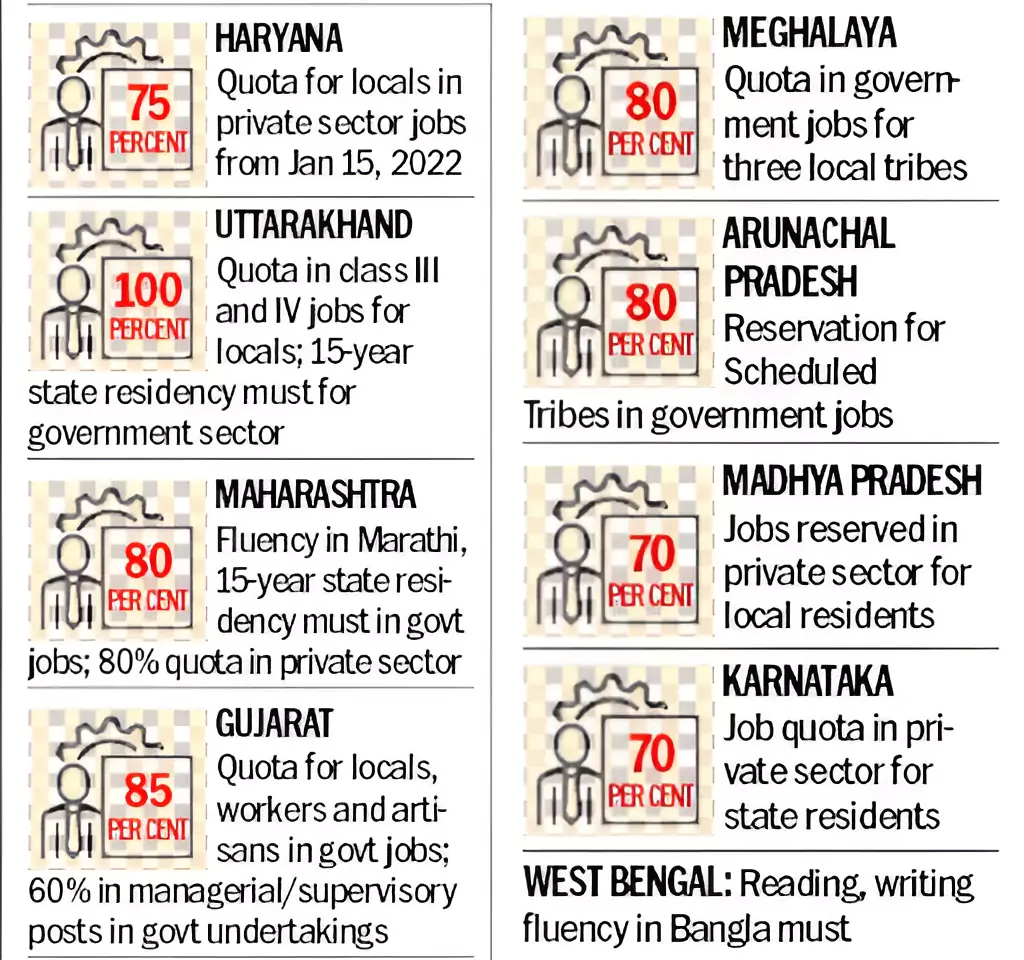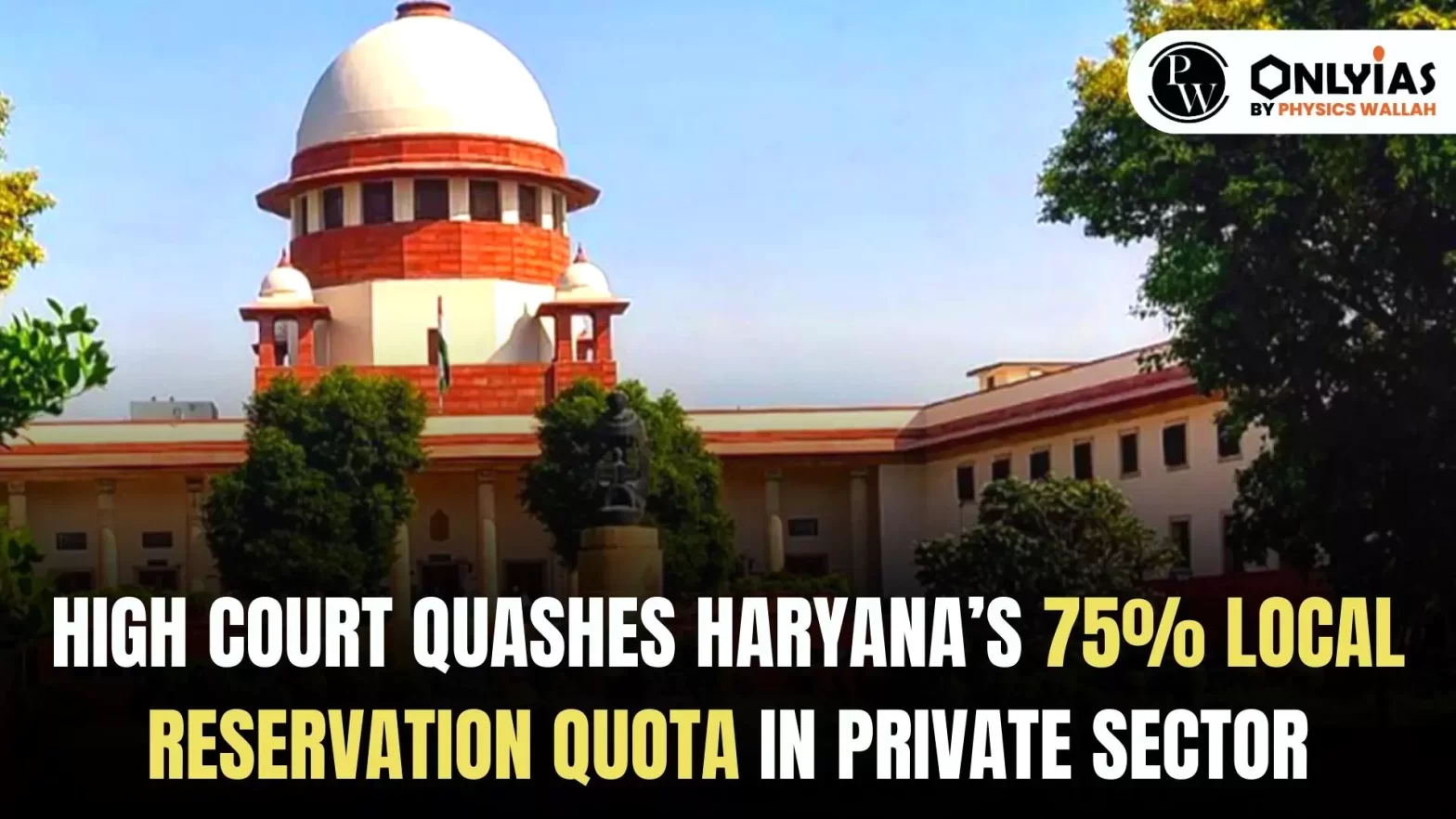Context:
- This article is based on an Editorial “Why HC has struck down Haryana’s private sector quota, and what happens now” which was published in the Indian Express. Recently, the Punjab and Haryana High Court quashed the Haryana State Employment of Local Candidates Act, 2020 guaranteeing 75% reservation to locals in private sector jobs in Haryana. The High Court asserted that the law to give effect to reservations in Haryana’s private sector was unconstitutional.
| Relevancy for Prelims: Articles of the Constitution with reference to the Reservation.
Relevancy for Mains: Local Reservation in India, its need, challenges, and the desired steps in this direction. |
What are the Haryana Government’s arguments supporting local reservation in private sector jobs?
- Non-Discrimination in Employment Allocation: The employment on the basis of domicile would not offend Article 15(1) of the Constitution.
- Article 15: The State should not discriminate against citizens on the basis of race, religion, caste, sex, place of birth, or any of them.
- Reasonable Classification: For the purpose of providing 75% employment in the private sector.
Know more about the Haryana Private Sector Job Reservation here.
What is Local Reservation?
- Concept: It was born out of concerns about job shortages and the necessity for governments to satisfy their domestic electorates.
- Policy: It states that the jobs created will be offered first to belonged persons in that State.

What are the reasons behind the demand for local reservation?
- Jobless Growth: The early 1990s LPG reforms have been criticized for not adequately translating into job creation, exacerbating economic insecurity, and fueling the demand for local reservations.
- Agrarian Distress: Years of low returns from agriculture, coupled with fractured landholdings and inadequate non-farm incomes, have contributed to the demand for local reservations.
- Lack of Opportunities: The lack of sufficient employment opportunities in the manufacturing sector has made it difficult for surplus agricultural labor to find alternative employment.
- Employment Situation: The COVID-19 lockdown exacerbated the unemployment crisis, particularly among migrant workers in urban areas.
- Populist Impulse and Youth Support: A 2017 national survey by CSDS and Lokniti found that nearly two-thirds of the youth support job reservations for locals.
- Reservation in Other States: Several states like Madhya Pradesh, Andhra Pradesh, Maharashtra, and Karnataka, have implemented local reservation policies.
- Fear of losing out: Increasing reservation demands from the fear of losing privilege and the inability to cope with change.
What are the arguments opposing local reservation in the private sector?
- Balancing Fundamental Rights and State Intervention: By reservation, the State government intervenes in the fundamental rights, (Article 19: to carry on their business and trade).
- Exodus of Low-Paid Workers: They would be unable to find work unless their states of origin give them sufficient job opportunities.
- The Erosion of Common Citizenship: It is contrary to the concept of common citizenship provided in the Constitution of India.
- Striking at the Core of Meritocracy: It is against the fundamental principle of merit that alone drives the private sector.
What are the arguments supporting local reservation in the private sector?
- Discriminatory Policies: As per a 2019 study at Azim Premji University, SC/ST communities were over-represented in low-paying jobs and under-represented in high-paying ones.
- Upholding Social Justice: A quota-based reservation system in the private sector in this context becomes not only necessary but also inevitable.
- Global Precedents: Even in the US, companies like General Motors and Ford have systems in place to employ African Americans, Asians, and so on.
- Advocating Parity in Social Commitments: Similar conditions should be applied to the private sector which has been given a lot of concessions by the government to enhance industrial growth.
- Employment Equality for Stakeholders in the Private Sector: Those whose land, labor, and capital are being used by the Private Sector, have a right to equality in job distribution.
The Need of the Hour
- Voluntarily Code of Conduct (VCC) to ensure social justice in their organizations.
- Focus on Human development by imparting skills to the labor by the government.
- Shifting Government Focus from Employment Guarantees to Inequality Reduction.
- Safeguarding Fundamental Rights in Policy Formulation to avoid any violation thereof.
Conclusion:
The debate on local reservation in the private sector highlights the challenge of balancing regional concerns with principles of non-discrimination and meritocracy, emphasizing the need for thoughtful policy solutions and inclusive development.
![]() 20 Nov 2023
20 Nov 2023

